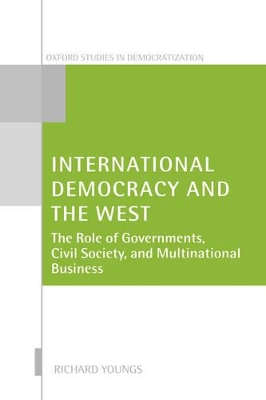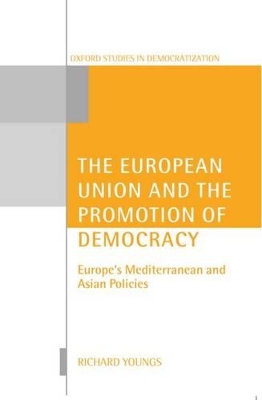Oxford Studies in Democratization
3 total works
This book adds to debates over the international dimensions of democratic change by studying the policies and actions of three sets of Western actors: namely, governments, multinational companies, and international NGOs. This actor-based triangular approach responds to observations that the strategic, economic, and social aspects of international democracy have rarely been studied in a combined, holistic fashion. During the 1990s, Western governments, multinational
companies, and civil society organizations all came to engage more notably in debates over democratic trends. But were they genuine when they professed a concern with democracy in developing countries? Which of these dynamics - governmental, commercial, or social - was the most influential in
propelling efforts to encourage democratization and which helped explain the limits of democracy's international reach? Did political, economic, and social actors form a broad network of international democratic momentum, or did their respective perspectives increasingly diverge? Exploring these questions, the book presents extensive empirical material relating to Western policies in a number of developing regions, covering the period from the mid-1990s to 2003.
Oxford Studies in Democratization is a series for scholars and students of comparative politics and related disciplines. Volumes concentrate on the comparative study of the democratization process that accompanied the decline and termination of the cold war. The geographical focus of the series is primarily Latin America, the Caribbean, Southern and Eastern Europe, and relevant experiences in Africa and Asia. The series editor is Laurence Whitehead, Official Fellow, Nuffield College,
University of Oxford.
companies, and civil society organizations all came to engage more notably in debates over democratic trends. But were they genuine when they professed a concern with democracy in developing countries? Which of these dynamics - governmental, commercial, or social - was the most influential in
propelling efforts to encourage democratization and which helped explain the limits of democracy's international reach? Did political, economic, and social actors form a broad network of international democratic momentum, or did their respective perspectives increasingly diverge? Exploring these questions, the book presents extensive empirical material relating to Western policies in a number of developing regions, covering the period from the mid-1990s to 2003.
Oxford Studies in Democratization is a series for scholars and students of comparative politics and related disciplines. Volumes concentrate on the comparative study of the democratization process that accompanied the decline and termination of the cold war. The geographical focus of the series is primarily Latin America, the Caribbean, Southern and Eastern Europe, and relevant experiences in Africa and Asia. The series editor is Laurence Whitehead, Official Fellow, Nuffield College,
University of Oxford.
This book examines the European Union's response to the Arab spring, from late 2010 to the beginning of 2014. It investigates how far the EU changed its policies towards the Middle East and North Africa (MENA) region in the aftermath of the Arab spring, and what impact European policies had in either helping or hindering democratization reforms during this period. It also explores what impact the Arab spring had on European security and economic interests.
Analytically the book unpacks the factors that best explain EU policy choices in the Middle East since 2010. It highlights how the responses to the Arab spring have changed the governance dynamics of the EU-Middle East relationship. The book assesses how far the EU foreign policy has succeeded in meeting the challenge of the Arab spring.
Oxford Studies in Democratization is a series for scholars and students of comparative politics and related disciplines. Volumes concentrate on the comparative study of the democratization process that accompanied the decline and termination of the cold war. The geographical focus of the series is primarily Latin America, the Caribbean, Southern and Eastern Europe, and relevant experiences in Africa and Asia. The series editor is Laurence Whitehead, Official Fellow, Nuffield College, University
of Oxford.
Analytically the book unpacks the factors that best explain EU policy choices in the Middle East since 2010. It highlights how the responses to the Arab spring have changed the governance dynamics of the EU-Middle East relationship. The book assesses how far the EU foreign policy has succeeded in meeting the challenge of the Arab spring.
Oxford Studies in Democratization is a series for scholars and students of comparative politics and related disciplines. Volumes concentrate on the comparative study of the democratization process that accompanied the decline and termination of the cold war. The geographical focus of the series is primarily Latin America, the Caribbean, Southern and Eastern Europe, and relevant experiences in Africa and Asia. The series editor is Laurence Whitehead, Official Fellow, Nuffield College, University
of Oxford.
This book assesses European Union policies aimed at encouraging democratization in East Asia and the North African and Middle Eastern States within the Euro-Mediterranean Partnership - these two regions being the source of some of the strongest conceptual challenges to 'Western' liberal democracy since the end of the cold war. The book addresses theoretical debates over the international dimensions of political change and the EU's characteristics as an international
actor. The factors both driving and inhibiting European democracy promotion policies are explored. The book outlines the EU's distinctive bottom-up philosophy, aimed at constructing the socio-economic and ideational foundations for political liberalization, but argues that the EU has in practice
failed to develop a fully comprehensive and coherent democracy promotion strategy.
actor. The factors both driving and inhibiting European democracy promotion policies are explored. The book outlines the EU's distinctive bottom-up philosophy, aimed at constructing the socio-economic and ideational foundations for political liberalization, but argues that the EU has in practice
failed to develop a fully comprehensive and coherent democracy promotion strategy.


